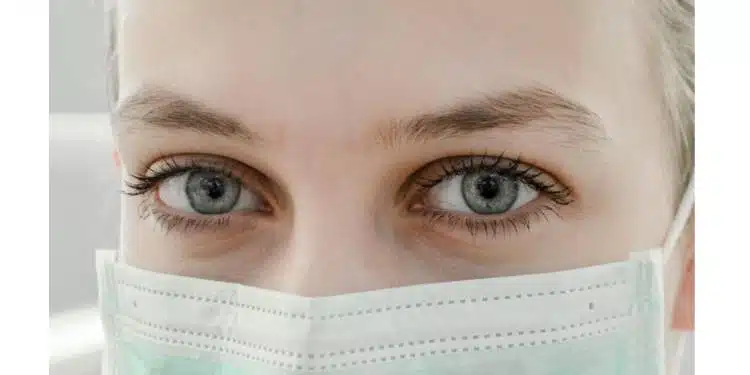by Leslie Farin
I’ve always had vision problems. I started wearing glasses in fifth grade, then contacts in junior high school. At age 35, I had Lasik surgery and felt like I had a whole new lease on life! I loved waking up with clear vision where I could read the clock without having to fumble for my glasses.
Now 60, I have new issues. Not only I am now wearing progressive glasses and trifocal contact lenses, but I have serious dry eye, the beginnings of cataracts, and am starting to have difficulty with night driving. Ugh.
As I know others have eye issues as well, I decided to ask my eye doctor and friend, Larry Taub, M.D., about eye health and how to prevent or slow future issues. Here’s a summary of our conversation.
Age-Related Eye Problems and What You Can Do About Them
Age brings changes that may weaken your vision and eyes, but there are things you can do to maintain lifelong eye and overall health.
You’ve probably noticed changes in your vision since age 40 or so. Perhaps you need reading glasses or have trouble adjusting to glare. Don’t worry – these changes are a normal part of aging that by themselves won’t prevent you from enjoying your usual activities.
As you age, especially after age 60, your risk of developing more serious age-related eye issues increases. Some of the more common problems are age-related macular degeneration (AMD), diabetic eye disease, cataracts, glaucoma, low vision, and dry eye.
According to Larry Taub, M.D., ophthalmic surgeon at Newman & Taub Vision Center in Dallas, some of us are at higher risk than others for these age-related eye problems due to heredity and sometimes race.
“However,” says Dr. Taub, “smart lifestyle decisions can go a long way to slow the progression of some of these problems”.

Age-Related Macular Degeneration (AMD)
Age-related macular Degeneration (AMD) is an eye condition that gradually destroys the sharp, central vision we count on to see objects right in front of us and to participate in everyday activities such as reading, driving, and cooking. In some cases, AMD advances so slowly that vision loss does not occur for a long time. You might notice a blurred area near the center of your vision, but it may not be problematic enough to do something about it. In other situations, the disease progresses faster and can lead to a loss of vision in one or both eyes. You might be able to decrease your risk of AMD or slow its progression by making these healthy choices:
- Avoid smoking.
- Exercise regularly.
- Maintain normal blood pressure and cholesterol levels.
- Eat a healthy diet rich in green, leafy vegetables and fish.
Diabetic Eye Disease
Diabetic eye disease is a complication of diabetes and a leading cause of blindness. The most common form is diabetic retinopathy which occurs when diabetes damages the tiny blood vessels inside the retina. There are no warning signs, but with dilated eye exams at least once a year, your doctor can find the disease early and treat it before it causes vision loss or blindness. You can reduce your risk of blindness by 95 percent with early detection and treatment! Diabetic macular edema (DME), cataracts, and glaucoma affect people with diabetes. Good lifestyle choices to delay this condition include:
- Control your diabetes with prescribed medications, regular exercise, and a healthy diet.
- Get a dilated eye exam at least once/a year for early detection.
- Once diagnosed, get timely treatment and regular follow-up care
- Tightly control your blood pressure and maintain normal cholesterol levels.
- Avoid smoking.
Cataracts
A cataract is the clouding of the lens in your eye. We all get cataracts eventually, but most of us choose not to do anything about them until they start to interfere with our usual activities. You may realize you have cataracts when your vision appears blurry, colors seem faded, and you notice a lot of glare.
Dr. Taub describes the condition as “similar to a dirty windshield – you may be able to live with it for quite a while and decide to clean it only when it impairs your driving”.
So, what can you do to slow the progression?
- Eat a healthy diet rich in green, leafy vegetables and fish.
- Cut back on the cocktails.
- Protect your eyes from the sun.
- Keep your diabetes under control.
- Avoid using corticosteroid medications for any length of time if you are able.
- Avoid smoking.
Glaucoma
Glaucoma happens when the pressure in your eye damages your optic nerve. Though you can lose your eyesight permanently over time, you can take steps to slow it down and help save your vision. Most importantly, get your eyes checked regularly to spot and manage glaucoma early on. The American Academy of Ophthalmology recommends you have what’s called a comprehensive dilated eye exam by age 40 to get a baseline picture of your eye health. That way, your doctor can track changes in your vision from one checkup to the next.
Low Vision
- Make sure you have adequate lighting in your home.
- Use a magnifying glass.
- Read large print books.
- Add a high contrast stripe on steps to help prevent falls.
Dry Eye
Dry eye syndrome is one of the most common complaints among middle-aged and older adults. More than 10 million Americans suffer from this condition and our environment can make it worse; for example, fans, air conditioning, heat, wind, and pollution factors contribute to the problem. The uncomfortable symptoms of dry eye include irritation, itching, burning, or blurred vision. You might find some relief by changing some of your everyday habits.
- Eat a healthy diet rich in green, leafy vegetables and fish.
- Avoid smoking.
- Exercise regularly.
- Maintain normal blood pressure and cholesterol levels.
- Use over-the-counter lubricating drops but not “Get the Red Out” drops, which can be harmful, as per Dr. Taub
The Bottom Line
Regular eye exams are the best way to ensure eye health and prevent the onset of possible age-related eye problems. However, are you aware that what you do outside the doctor’s office to take care of your eyes matters too? The lifestyle choices you make about the foods you eat, how much you exercise, and what kind of accessories you wear can greatly influence your vision.
Dr. Taub strongly encourages his patients to make healthy choices. He stresses the importance of wearing UV protection sunglasses outside to reduce exposure to damaging sun rays to prevent harming your eyes. He also recommends quitting if you smoke. Every cigarette causes damage to the blood vessels in your eyes and promotes eye disease. He advises consuming eye-healthy foods, particularly those high in antioxidants that can help decrease the risk of eye disease. Eye-healthy food includes spinach, eggs, orange-colored fruits, flax seeds, and nuts. Finally, Dr. Taub advises his patients to maintain a healthy weight through healthy eating and exercise. Severely overweight people are at great risk for developing type 2 diabetes, which can lead to diabetic retinopathy.
These healthy lifestyle choices are the same ones we all hear over and over for overall optimum health -not just eye health. Most of us know what we “should” do, but don’t. Start with one small change at a time to start taking steps to keep your eyes healthy. Don’t take your vision for granted.
About Dr. Larry Taub











